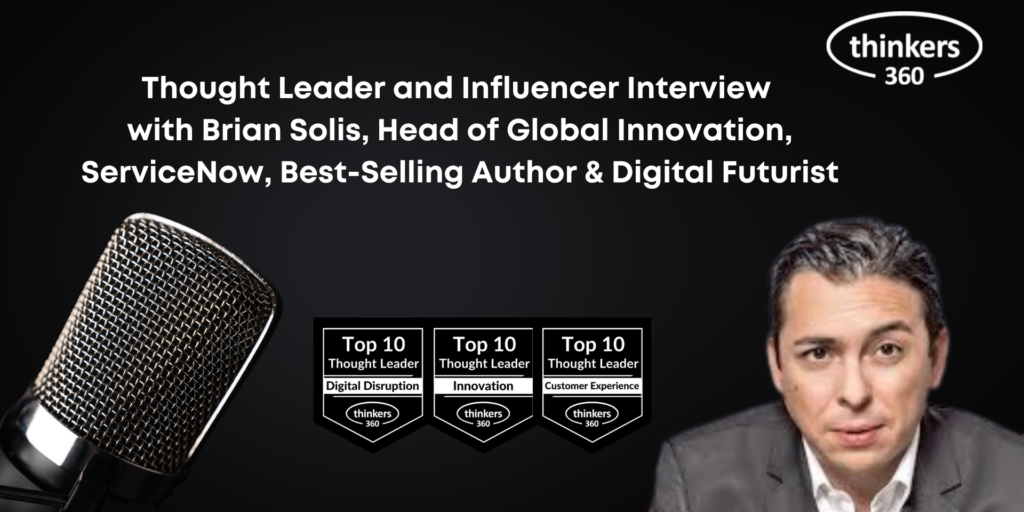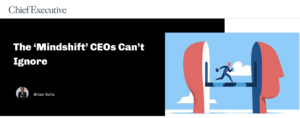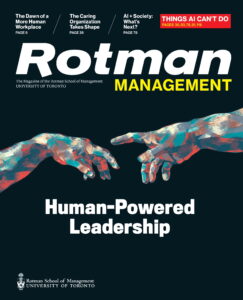
via Thinkers360
Thought Leader and Influencer Interview
Thinkers360 thought leader interviews profile prominent members of the Thinkers360 community who embody the power of ideas in their work. In this edition, we speak with Brian Solis, head of global Innovation, ServiceNow.
Brian is an eight-time, best-selling, and award-winning author and has published more than 60 research reports on the future of business, work, digital transformation and innovation across industries such as retail, healthcare, financial services, insurance, and public sector.
His blog, BrianSolis.com, is among the world’s leading business online resources to his 800,000 followers. Brian also contributes to Fast Company, ZDNet, Forbes, Worth, CIO, and Singularity University.
In his new book Mindshift: Transform Leadership, Drive Innovation, and Reshape the Future, you’ll discover why legacy leadership continues to miss the mark and fail to adequately account for change and innovation, causing people to miss the winds of opportunity or threats of disruption until it’s too late. His research-backed tools, insights and lessons show how anyone can become an unstoppable leader, in both business and life.
Brian is featured in Thinkers360’s annual leaderboards: Top 50 Global Thought Leaders and Influencers on Metaverse 2024, Top 50 Global Thought Leaders and Influencers on Digital Disruption 2024, and Top 50 Global Thought Leaders and Influencers on Future of Work 2024 among others.
In this thought leader and influencer interview, we asked Brian specifically about his new book “Mindshift” (see press release) which was just published on October 15th 2024.
Thinkers360: How would you define a “mindshift”?
BDS: A mindshift is the process of fundamentally changing how we see the world and ourselves in it. It’s about breaking free from old patterns of thinking and embracing new perspectives that enable us to adapt, innovate, and lead in times of disruption. A mindshift allows us to reframe challenges as opportunities and empowers us to envision a future that doesn’t yet exist, but that we have the power to create.
Thinkers360: Can you tell us more about your background and why you are considered one of the greatest digital analysts of our time?
BDS: I’ve spent my career studying the impact of emerging technologies on businesses and society. As a digital analyst and anthropologist, I’ve had the opportunity to work with some of the world’s most influential companies and thought leaders. My work involves not just analyzing trends but understanding the deeper shifts in human behavior and how technology can be a catalyst for positive change. My goal has always been to help people and organizations understand these changes and harness them to create meaningful, lasting impact.
Thinkers360: With disruption comes difficulty. In what ways is someone’s mindset the most important part of the equation of success?
BDS: Our mindset is the lens through which we interpret and react to the world around us. In times of disruption, a growth-oriented mindset can turn obstacles into steppingstones. When we view challenges as opportunities for growth, we’re more resilient, adaptable, and innovative. It’s not the disruption itself but how we respond to it that determines our success. A mindshift equips us with the mental agility to see beyond the immediate difficulty and envision new possibilities.
Thinkers360: You coined the term, “Novel Economy.” What is it and why is it important?
BDS: The “Novel Economy” refers to the new landscape shaped by unprecedented technological, social, and economic changes. It’s an era where the old rules no longer apply, and new opportunities are emerging that require a fresh mindset. This economy values innovation, adaptability, and the ability to think beyond traditional models. It’s important because it demands that we continually evolve our thinking, be open to new ideas, and actively participate in shaping the future.
Editor’s Note: See Brian Solis´s profile to work with him directly.
Thinkers360: What is a “Ctrl+Alt+Delete opportunity” and how can we use it for our benefit?
BDS: A “Ctrl+Alt+Delete opportunity” is a chance to hit the reset button on our lives, careers, or organizations. It’s about recognizing moments when we need to reboot our thinking, let go of outdated practices, and start anew. By seizing these opportunities, we can reimagine our paths, innovate, and create something better. It requires courage and the willingness to question the status quo, but it opens the door to growth and transformation.
Thinkers360: You state that every mindshift begins with a spark of curiosity. Why is curiosity essential to shifting our mindset?
BDS: Curiosity is the fuel for learning and discovery. It pushes us to explore the unknown, ask questions, and challenge what we think we know. When we’re curious, we’re more open to new ideas and perspectives, which is crucial for making a mindshift. Curiosity allows us to see beyond our current limitations and imagine what’s possible, setting the stage for innovation and growth.
Thinkers360: You describe yourself as a “digital anthropologist.” How has your mindset impacted the trajectory of your career?
BDS: As a digital anthropologist, my focus has always been on understanding how technology impacts human behavior and culture. This mindset has driven me to look beyond the surface of technological trends and delve into the underlying shifts in how we live, work, and connect. It’s about recognizing patterns and understanding the ‘why’ behind the changes we see. This perspective has guided my work in helping organizations navigate digital transformation in a way that is human-centric and future-focused.
Thinkers360: Who is a modern figure that you would call a “mindshifter” and why?
BDS: One example is Satya Nadella (CEO of Microsoft). Nadella transformed Microsoft by fostering a growth mindset throughout the company. He shifted the culture from a fixed mindset focused on competition to one that emphasizes learning, innovation, and collaboration. Under his leadership, Microsoft embraced cloud computing, AI, and open-source software, reinvigorating the company’s relevance in the tech industry.
Thinkers360: You define a “change agent” as being a believer in and catalyst of progress. After researching change agents, what did you learn about them?
BDS: Change agents are individuals who see the world not just as it is, but as it could be. They are driven by a deep belief in the possibility of progress and are willing to take risks to make it happen. What I learned is that change agents come from all walks of life and organizational levels. They share a common trait: the courage to challenge the status quo and the determination to turn vision into reality. They are not deterred by obstacles; instead, they see them as opportunities to innovate.
Change agents are also not fearless; they often feel uncertainty and doubt, questioning if they have the strength or courage to drive change. This vulnerability is a part of the journey. What sets them apart is their willingness to act despite these feelings. They understand that making an impact requires having hard conversations and taking challenging actions.
Being a change agent means embracing discomfort, knowing that growth and transformation lie on the other side. It’s not about having all the answers; it’s about committing to the process of learning and evolving.
Every great change starts with a small, courageous step. Even if you don’t feel ready, your unique perspective and willingness to challenge the status quo are exactly what the world needs. Remember, it’s in those moments of uncertainty that true leaders are born.
Thinkers360: You’ve helped executives at companies like Uber, Airbnb, Walmart, and Coca-Cola in addition to celebrities such as Oprah, Shaq, and Ashton Kutcher make a mindshift towards emerging technology and society. What has collaborating with these companies and people taught you?
BDS: Working with such a diverse range of companies and individuals has taught me that the common thread in achieving a mindshift is willingness, like feeling the need because there is no other option, to embrace discomfort and uncertainty. For example, helping a startup like Uber challenged me to think beyond traditional business models and embrace the idea of disruptive innovation. Travis Kalanick always believed in the fight for the “truth.”
With Coca-Cola, the focus was on reimagining customer engagement in a digital age. Through these experiences, I learned that every organization, regardless of size, must be willing to rethink its approach to adapt to changing environments.
Collaborating with figures like Oprah and Ashton Kutcher has shown me that even those in the public eye must navigate their own mindshifts to stay relevant. Oprah, for instance, has continually evolved her media presence, showing the power of adapting to new platforms and technologies. Shaq and Ashton have leveraged their influence to back emerging technologies and startups, demonstrating how embracing change can lead to impactful investments.
These experiences reinforced the importance of a growth mindset and the courage to experiment, learn, and pivot. It’s not just about adopting new technologies but about transforming how we think about our roles in the world and the value we can create.
Thinkers360: How does this book apply to AI and other trends on the horizon like ambient and spatial computing?
BDS: Mindshift provides a framework for how to approach and adapt to rapidly evolving technologies like AI, ambient, and spatial computing. These trends are reshaping how we interact with the world and each other. By adopting a mindshift, we become more open to exploring these technologies’ potential, understanding their impact, and leveraging them to create positive change. The book encourages us to view these advancements not just as tools, but as opportunities to reimagine the future.
Thinkers360: How is this different from other leadership and management books?
BDS: Mindshift delves into the fundamental personal change in thinking required to lead in today’s world. It’s not just about managing people or processes; it’s about transforming how we see the world, ourselves, and our role in shaping the future. It’s a call to action for leaders to embrace a new mindset that is adaptable, curious, and innovative. It’s about leading with a vision that inspires others to join in creating a better tomorrow.
Thinkers360: What are the first steps anyone can take to jumpstart their mindshifting journey?
BDS: The first step is to embrace curiosity. Start asking questions and challenge your current way of thinking. Reflect on the assumptions you hold and be willing to see things from a different perspective. Next, step out of your comfort zone and seek new experiences that broaden your understanding of the world. Engage with people from diverse backgrounds, explore new technologies, and be open to learning. Remember, a mindshift begins with the willingness to change and the courage to take the first step.





Leave a Reply